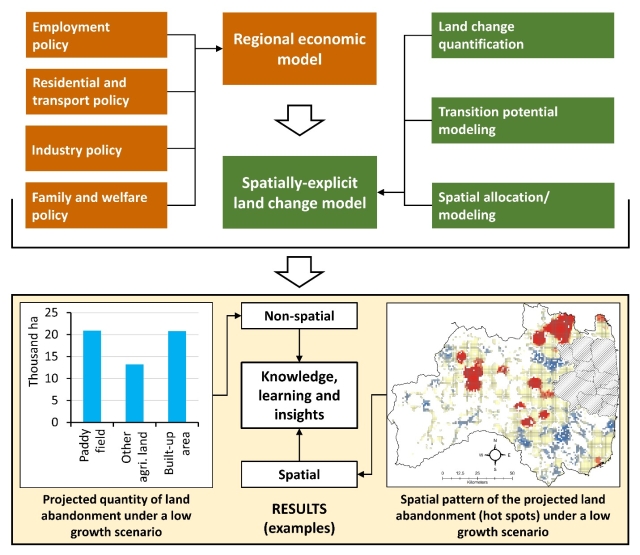論文情報
著者:Ronald C. Estoque, Kei Gomi, Takuya Togawa, Makoto Ooba, Yasuaki Hijioka, Chiaki M. Akiyama, Shogo Nakamura, Akira Yoshioka, Keisuke Kuroda
年:2019
掲載誌:Science of the Total Environment 692:903–916
論文へのリンク(英文のみ)
キーワード
Adaptation; Adaptive planning; Ecosystem services; Land abandonment; Land use; Population decline; Scenario analysis
概要
Land abandonment, e.g. agricultural land abandonment, can result in various social and ecological impacts. It would thus be helpful if the extent and spatial pattern of future land abandonment could be projected. However, the trajectory of future land abandonment generally depends on various factors, including biophysical conditions and future changes in socioeconomic indicators in the area. In this study, we developed a general framework for a scenario-based land abandonment projection, featuring a coupled regional economic and spatially explicit land change modeling approach. We applied this framework in selected municipalities in Fukushima Prefecture, Japan, under two socioeconomic development scenarios (2014–2050): low population and economic growth (LL scenario) and high population and economic growth (HH scenario). The case study results, which are also visualized through a set of hot spot maps, revealed that agricultural land abandonment would be more intense under the HH scenario due to the much higher future decline in farmer population driven by the shift in people's employment and main source of livelihood. Under the LL scenario, residential and urban land abandonment would be more profound because of the much higher future decline in total population. In general, our results provide insights into some plausible future socioeconomic changes, their interplay and their consequent land abandonment in the case study area, which would be useful in the context of forward-looking adaptive development planning. The proposed framework can be applied to other case study areas.





